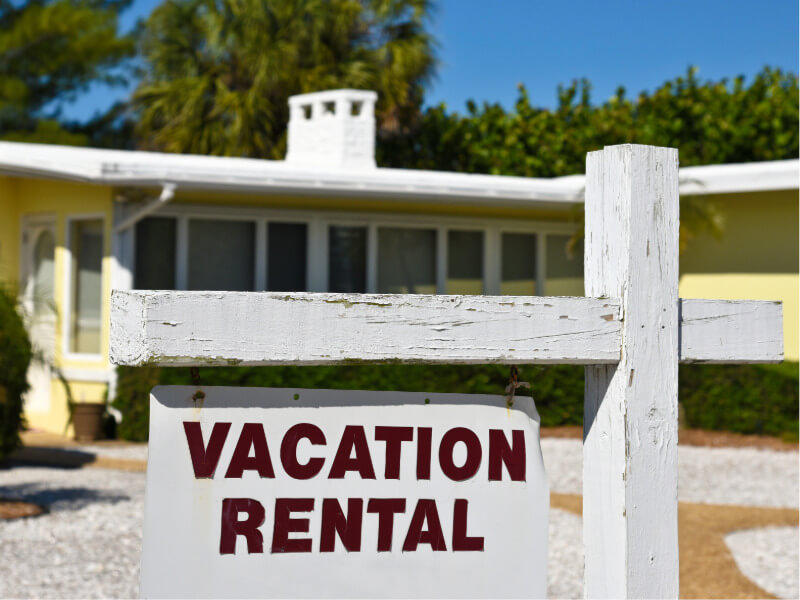
The rise of peer-to-peer platforms has transformed many industries, with vacation rentals leading the way. Platforms like Airbnb and Vrbo have made booking short-term stays not only easy but also highly customizable, giving visitors a chance to fully immerse themselves in the local culture—one of the key reasons for their popularity.
In North America, short-term rental (STR) bookings grew by an average of 32% year-over-year between October 2021 and October 2023, and this trend is expected to continue.
While communities across the U.S. enjoy the economic benefits of increased tourism, they are also grappling with the challenges of managing short-term rentals. Issues related to noise, trash, and strained infrastructure are among the concerns most often voiced by local communities.
Although governments have responded by implementing regulations, compliance remains a challenge. Some property owners are unaware of the requirements, some operate offline to avoid detection, and others find the licensing process overwhelming.
This article will outline seven steps governments can take to address these challenges and create a short-term rental licensing framework that is both current and future-proof.
1. Simplify the Short-Term Rental Licensing Process
Registering or licensing a short-term rental can feel daunting for prospective hosts. They often have to sift through government websites to find regulations like zoning laws. When they do find the information, it may be unclear, outdated, or confusing, requiring long back-and-forth interactions for clarification. This complexity not only discourages property owners from getting licensed but also makes it harder for governments to enforce regulations effectively.
Through digitization, governments can simplify the short-term rental licensing process to the benefit of both agency staff and hosts.
First, STR agencies can make guidelines easily accessible by creating resource hubs on their websites where applicants can download all necessary documents. Next, they can implement online application systems that let property owners submit details, upload documents, pay fees, track their application progress, and receive updates—all on one platform.
This simplified licensing process not only makes it easier for STR owners to comply with rules but also enables agency staff to channel their time and resources to other important tasks like enforcement and community engagement.
2. Create a Unified Platform for Licensing & Tax Filing
In addition to complexity, another challenge STR hosts face when seeking licensing is a disjointed process. Zoning approvals, safety code compliance, and tax obligations often require separate visits to different departments, making the process long and frustrating.
A short-term rental management system solves this issue by consolidating short-term rental licensing and tax filing onto one unified digital platform. This enables STR owners to apply and pay for all licenses and taxes in a single session from their computer or phone.
Communities that Successfully Implemented Unified Platforms for Licensing
Gilbert, AZ
The Town of Gilbert, Arizona, faced a significant challenge with its growing short-term rental market, fueled by over 5 million visitors per year. With just one person dedicated to handling all short-term rental registrations, the workload was overwhelming.
Implementing a unified, cloud-based licensing platform transformed their operations. Ashley Namor, Gilbert’s Business Compliance Project Manager, explains the change: “For us, using GovOS means a centralized place for all short-term rental issues, applications, questions, and resources. It’s been incredible.”
Okaloosa County, FL
Okaloosa County, Florida, also adopted a centralized platform as tourism surged in the region. County leadership recognized the need for a system to manage the collection of its Tourist Development Tax (TDT).
By implementing purpose-built STR software, Okaloosa County has maximized over $30 million in tourist tax revenue and simplified compliance.
3. Implement Flexible Zoning Regulations
 Zoning regulations are a crucial part of a government’s short-term rental regulation framework, as they dictate where STRs can be established and how they should be operated. For instance, Raleigh, NC, prohibits special events or gatherings in short-term rentals located in residential zoning districts.
Zoning regulations are a crucial part of a government’s short-term rental regulation framework, as they dictate where STRs can be established and how they should be operated. For instance, Raleigh, NC, prohibits special events or gatherings in short-term rentals located in residential zoning districts.
While zoning regulations are crucial, they are often too rigid for an industry as dynamic as short-term rentals.
To maintain order without limiting opportunities, local governments should develop flexible zoning policies that balance the concerns of all stakeholders. These regulations should:
- Promote the interests of homeowners who wish to rent their properties.
- Preserve neighborhood character and residents’ quality of life by preventing nuisances like excessive trash and noise.
- Prevent strain on infrastructure, such as water and waste management systems, by limiting the concentration of STRs in one area.
While no solution is perfect, a combination of public engagement and data-driven decision making can help governments craft flexible but precise zoning regulations.
Given that the short-term rental landscape is constantly changing, governments should regularly assess and update these policies based on market trends and community needs. For instance, increased tourist activity in previously low-traffic areas may warrant a zoning change.
Digital tools can help make zoning regulations easier to understand. For example, the City of Plano offers an interactive map through its “Map It Plano” service, showing residents which areas are permitted for new short-term rentals.
By proactively managing zoning rules, communities can better balance economic opportunities with community well-being.
4. Enforce Compliance Through Regular Audits & Penalties
With effective regulations in place, the next challenge for STR oversight agencies is enforcement.
Short-term rentals need routine checks to ensure compliance with safety codes, occupancy limits, proper waste disposal, and more. Without enforcement, occupants’ safety is at risk, neighborhood harmony is threatened, and unfair competition can arise between compliant rentals and those that flout the rules.
In addition to physical inspections, agencies can improve oversight with digital audits. The STR agency should require all hosts to display their license numbers on all online listings.
Short-term rental management software equipped with web crawlers can scan various rental listing sites, using these license numbers and location details to identify unregistered and non-compliant rentals. These illegal listings are compiled into a list, allowing government officials to send mass notifications to remind hosts of their obligations.
If a host receives a notice of violation and fails to address it, penalties are often imposed. Hefty fines, suspension of operations, or even permanent closure of non-licensed STRs can serve as strong deterrents for operators attempting to bypass regulations.
San Francisco is one city enforcing strict penalties, fining scofflaw operators at least $484 per day for each unit in violation and $968 per day for those with prior violations. These fines can accumulate quickly. In one case, the City Attorney sued a pair of repeat offenders for $5.5 million in penalties for operating illegal Airbnb rentals.
Ultimately, local governments that combine physical inspections with digitally powered audits can maximize compliance among STR owners.
5. Introduce Real-Time Data Tracking & Reporting
 To achieve maximum licensing rates and ensure consistent compliance, governments must implement real-time data tracking and short-term rental reporting.
To achieve maximum licensing rates and ensure consistent compliance, governments must implement real-time data tracking and short-term rental reporting.
A valuable source of real-time short-term rental data for governments is through partnerships with STR listing platforms. Airbnb pioneered this approach with its City Portal, launched in 2020 and now active in over 430 jurisdictions worldwide.
This platform provides government agencies and tourism organizations with actionable insights about their local STR landscape, centralized technical support, and tools for enforcing regulations.
Key features of the Airbnb City Portal include:
- Enforcement tools: Agency staff can search the platform for listings that appear in their registration database, monitor their real-time activity, and take action on non-compliant listings.
- Support tools and resources: The portal offers easy access to resources that assist enforcement, including Airbnb’s 24/7 neighborhood support line and a dedicated law enforcement portal.
- Data dashboard: The dashboard displays local insights such as the number of guests per month, their origins, and average daily spending, helping to inform regulatory policies and tourism development strategies.
Such partnerships with listing platforms, along with independent tracking, help local governments maintain a comprehensive view of their short-term rental ecosystem.
6. Support Hosts With Comprehensive Educational Resources
Well-informed operators are one of the cornerstones of a successful short-term rental licensing program. When property owners fully understand the compliance requirements, they are more likely to operate legally and responsibly. Local governments can support this by providing educational materials that guide hosts through every stage of the STR licensing process.
On-demand guides and tutorials are key tools for educating hosts. These materials should break down the application process, explain legal obligations, and clarify ongoing responsibilities like tax collection and safety regulations. Complex ordinances can be put into factsheets, FAQs, and audio-visual aids to help constituents self-educate easily.
Governments can also offer live training sessions for more in-depth instruction. Fort Worth, Texas, for example, holds occasional group and one-on-one training on its Hotel Occupancy Tax Program, guiding owners on tax responsibilities and the remittance process.
For urgent inquiries, dedicated support services like hotline numbers, chat support, and email channels enable hosts to get quick answers. Even better if your agency can provide multilingual support, as that promotes the inclusion of diverse populations.
Another way governments can promote owner education is through incentives. In Plano, TX, short-term rental owners receive a $100.00 registration fee rebate for attending an STR operator training program.
In the long run, universal short-term rental education not only improves compliance rates, but also empowers hosts to provide better guest experiences, which can improve the reputation of the local STR market.
7. Adapt Licensing Requirements for Different Property Types
Instead of enforcing blanket regulations that can exclude many residents, governments should customize licensing requirements based on different property types and the unique aspects of the local STR ecosystem.
This varied approach to licensing helps uphold municipal codes and community standards while promoting short-term rental enterprises of all sizes.
Different license tiers can allow property owners to pay a fair rate based on the nature of their rental operation. For example, someone who goes on a two-week vacation and decides to rent their home for extra income might pay a lower annual fee.
Licensing requirements should be adapted based on the area’s characteristics. In the primary tourist areas of a community, an agency might allow a higher concentration of short-term rentals while fewer are permitted in residential neighborhoods.
By keeping regulations flexible yet firm, governments can maximize the economic benefits of short-term rentals while maintaining harmony in their jurisdictions.
Future-Proofing Government Regulations for the STR Market
As populations grow in communities nationwide, the short-term rental market is set to expand in many jurisdictions. To avoid falling behind, agencies must continuously refine their STR licensing process to be as simple, comprehensive, and flexible as possible.
This can all be achieved with a single software solution. The GovOS Short-Term Rental Solution is an industry-leading, cloud-based software that provides dynamic solutions for all stages of short-term rental licensing—from compliance and registration to taxation. Talk to a GovOS expert to learn more.









